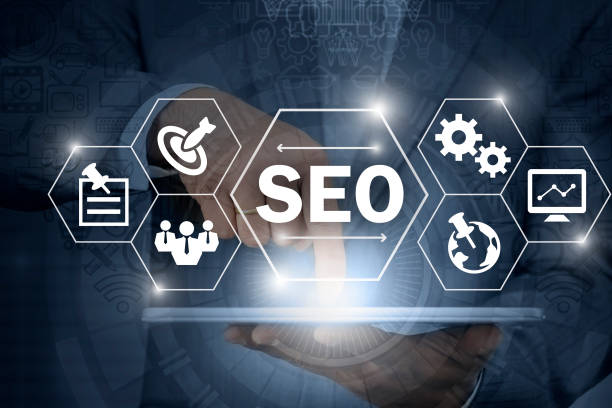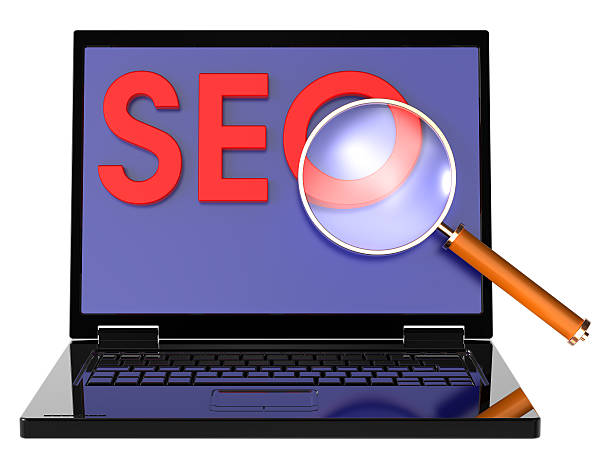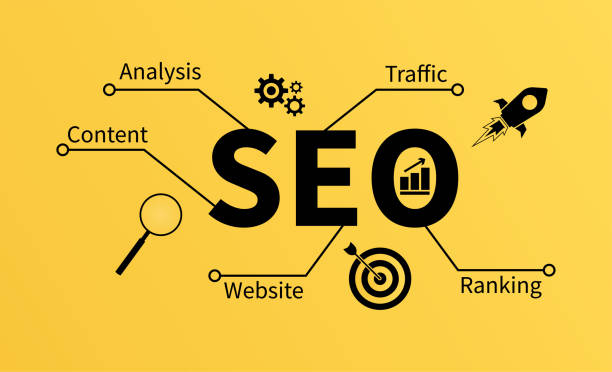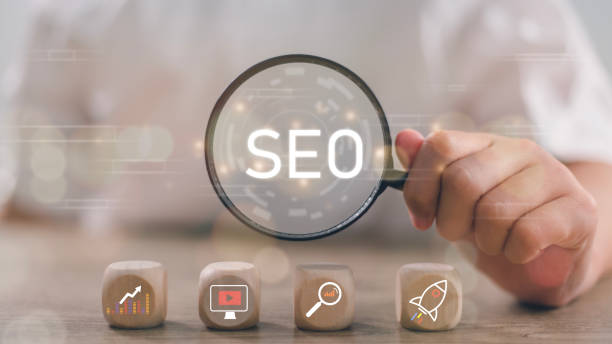What is Off-Page SEO and Why is it Crucial?

Off-Page SEO refers to a set of actions performed outside of your website with the aim of improving its ranking in search engine results. These actions include activities that increase your domain’s credibility, relevance, and authority in the eyes of search engines.
#Backlinks, #Social_Signals, and #Brand_Mentions are considered among the most important factors of #Off-Page_SEO.
The importance of Off-Page SEO stems from the fact that search engines like Google consider a website more authoritative if other reputable websites refer to it.
These references, especially high-quality backlinks, are a sign of your content’s credibility and value.
Without a strong strategy for off-site optimization, even if your on-page content is flawless, reaching high rankings in search results will be very difficult.
This is a crucial part of search engine optimization that every online business should pay special attention to.
The main goal of Off-Page SEO is to increase the website’s authority and position in the eyes of search engines, and this is only possible by acquiring legitimate and natural references.
This aspect of SEO is a specialized activity that requires a deep understanding of Google’s algorithms and how it values content.
This section of SEO discussions is entirely explanatory and educational for a basic understanding of this concept.
Are you tired of your e-commerce website not generating as much revenue as it could? Rasaweb, specializing in professional e-commerce website design, solves this problem permanently!
✅ Increase sales rate and revenue
✅ High load speed and unparalleled user experience
⚡ Get free consultation for e-commerce website design
The Role of Backlinks in Empowering Off-Page SEO

Backlinks, or inbound links, are the backbone of Off-Page SEO.
In fact, a backlink signifies a vote of confidence from another website to yours.
The more numerous and higher quality these backlinks are, the more your domain’s credibility and authority increase in the eyes of search engines.
Google’s algorithms interpret backlinks as a sign of a website’s popularity and authority. However, not all backlinks are created equal.
Backlink quality is far more important than its quantity.
A backlink from a website with high domain authority (such as reputable news websites, universities, or recognized authorities) can be worth far more than dozens of backlinks from low-quality or spammy websites.
A successful strategy for strengthening Off-Page SEO through backlinks focuses on acquiring natural and relevant links from authoritative sources.
This approach not only helps improve rankings but also reduces the risk of being penalized by Google.
Link building is a time-consuming process that requires patience and persistence, but its results in improving your site’s position in the long run are unparalleled.
This section of the article provides practical guidance for understanding how backlinks influence your website’s ranking and gives you an analytical perspective.
Acquiring high-quality backlinks is considered one of the primary goals in the field of Off-Page SEO.
Types of Backlinks and Quality Criteria in Off-Page SEO

In the world of Off-Page SEO, understanding the types of backlinks and their quality criteria is of paramount importance.
Backlinks can be categorized by nature into different types, including editorial links (from articles and blog posts), directory links, social media links, forum links, and the like.
But more important than the type is the backlink’s quality.
Backlink quality criteria include the Domain Authority (DA) and Page Authority (PA) of the source website, the thematic relevance of the source website to your content, and the naturalness of the link acquisition process. Links that are created naturally and organically from relevant and high-quality content have the most value.
PBN (Private Blog Network) links or purchased links, whose aim is to deceive algorithms, can lead to site penalties.
This is an educational and specialized section for a deeper understanding of backlink quality in Off-Page SEO.
For more clarity, the table below shows common backlink types and their characteristics:
| Backlink Type | Description | Value in Off-Page SEO |
|---|---|---|
| Editorial Links | Links naturally given to you from relevant and high-quality content on other websites. | Very High |
| Profile Links | Links created from user profiles on forums, social networks, or websites. | Medium (depending on platform authority) |
| Comment Links | Links placed in the comments section of blogs or articles. Often NoFollow. |
Low (often for traffic, not SEO) |
| Directory Submissions | Website submission to reputable and relevant directories. | Medium to Low (only truly reputable directories) |
For success in Off-Page SEO, focusing on quality, relevance, and diversity in link building is crucial.
Effective Link Building Strategies for Off-Page SEO

Effective link building is the beating heart of Off-Page SEO, and without a well-defined strategy, achieving desired results is almost impossible.
One of the best methods is to create unique and valuable content that naturally attracts links (link baiting).
Content including statistical data, original research, infographics, and comprehensive guides often has high linkability potential.
Another method is guest posting on relevant and reputable blogs; this not only helps acquire backlinks but also increases referral traffic and introduces your brand to new audiences.
Broken Link Building is also a smart strategy; you find websites with broken links to content relevant to your field and then suggest replacing the broken link with your content.
Also, participating in specialized forums and answering questions related to your field, by adding links to useful resources (which could be your website) if necessary, is a way to acquire backlinks.
A digital PR strategy can also play a significant role in acquiring news-related and authoritative links.
Each of these strategies requires meticulous planning and continuous execution to best assist your Off-Page SEO. This topic is entirely guiding and analytical, providing a specialized perspective for implementing Off-Page SEO strategies.
Are you tired of your e-commerce site having visitors but no sales? Rasaweb solves your main problem with professional e-commerce website design!
✅ Significant sales increase with targeted design
✅ Seamless user experience for your customers
⚡ Get a free consultation!
The Importance of Anchor Text and Its Relation to Off-Page SEO

Anchor Text is the visible, clickable text in a hyperlink.
The importance of anchor text in Off-Page SEO is extremely high because it signals to search engines what the linked page is about.
Using relevant and diverse anchor texts helps Google better understand the main topic of the destination page and give it a better ranking in search results for related keywords. Excessive use of a specific anchor text or repetitive keywords (Over-Optimization) can lead to penalties by Google’s Penguin algorithm.
Therefore, diversity in anchor texts is essential.
Anchor texts can include Exact Match keywords, Partial Match keywords, Branded, URL, and Generic.
For example, if you have a website about “website optimization,” it is recommended to use anchor texts such as “SEO site,” “SEO consultation,” “SEO guide,” as well as your brand name, alongside using your site’s URL.
A natural and diverse anchor text profile is a sign of healthy and organic link building. This section is a comprehensive educational and explanatory guide on the importance of anchor text in improving your website’s Off-Page SEO.
Paying attention to this aspect of Off-Page SEO can make a significant difference in the performance of your link-building campaigns.
Examining Secondary Factors in Off-Page SEO Beyond Backlinks

Although backlinks play a pivotal role in Off-Page SEO, other factors can also indirectly impact your site’s ranking and authority.
One of these factors is Social Signals. Although Google has repeatedly stated that social media likes and shares are not directly considered ranking factors, increased social media engagement can lead to increased brand awareness, direct website traffic, and ultimately, more opportunities to acquire backlinks.
When your content goes viral on social networks, the likelihood of it being seen by webmasters and other industry professionals increases, which can lead to natural link building.
Brand Mentions without links are also important factors. Whenever your brand name is mentioned on news websites, blogs, or other online sources, even if no link is provided to your site, Google can consider these mentions as a sign of popularity and authority.
This indicates that your brand is growing and becoming more recognized.
Participating in online forums and Q&A websites like Quora or Reddit, and providing useful and valuable answers, can not only generate referral traffic but also contribute to your brand’s credibility.
These are aspects of Off-Page SEO that are often overlooked but have high potential for overall improvement of your online credibility.
This aspect of Off-Page SEO is an explanatory and engaging topic for those looking to go beyond traditional strategies.
Tools and Techniques for Monitoring Off-Page SEO

Monitoring and analyzing Off-Page SEO is crucial for long-term success and identifying potential opportunities and issues.
Various tools are available to assist you in this area.
SEMrush, Ahrefs, and Moz are among the most prominent backlink analysis tools. These tools allow you to examine your backlink profile and that of your competitors, identify broken links, find high-authority domains, and track the progress of your link-building strategies.
For example, Ahrefs, with its vast backlink database, enables detailed examination of anchor texts, referring domains, and link types.
Moz, with its Domain Authority and Page Authority metrics, is also an excellent tool for assessing the quality of linking domains.
Using Google Search Console is also essential for identifying internal and external links to your site, as well as suspicious links that might harm your site.
Continuous monitoring not only helps you track new links but also allows you to identify toxic backlinks and disavow them through Google’s Disavow tool to prevent site penalties.
This is a crucial section for anyone seriously looking to improve their site’s Off-Page SEO. This section provides an analytical and educational guide on Off-Page SEO monitoring tools.
The table below lists some of these tools and their main applications in Off-Page SEO:
| Tool Name | Key Capabilities | Important Notes for Off-Page SEO |
|---|---|---|
| Ahrefs | Deep backlink analysis, competitor keyword research, content analysis | Examining competitor backlink profiles, finding link-building opportunities, identifying broken links |
| SEMrush | Backlink analysis, keyword research, competitor analysis, content SEO tools | Checking inbound and outbound links, tracking brand mentions, finding relevant domains |
| Moz Pro | Domain Authority (DA) and Page Authority (PA) metrics, link analysis, rank tracking | Evaluating the quality of linking domains, identifying spam score, assisting in link-building decisions |
| Google Search Console | Performance reports, index coverage, site security, external links | Identifying inbound links to the site, using the Disavow tool for toxic links |
Accurate monitoring of these metrics allows you to optimize and make your Off-Page SEO strategies more efficient.
Avoiding Common Mistakes in Implementing Off-Page SEO

While Off-Page SEO has great potential for rank improvement, common mistakes can lead to severe Google penalties.
One of the biggest mistakes is bulk purchasing low-quality backlinks or using PBNs (Private Blog Networks). Google strongly combats unnatural and manipulated link building and can remove your site from search results or severely reduce its ranking.
Solely focusing on backlink quantity while ignoring their quality and relevance is also a grave error.
Ten quality links from reputable and relevant domains are worth far more than hundreds of worthless and spammy links.
Another mistake is overusing exact match keyword anchor texts, which can be identified as Over-Optimization.
The anchor text profile must be diverse and natural. Furthermore, failing to monitor the backlink profile and ignoring toxic links, which may have been created by competitors or due to past mistakes, can harm the site.
Ignoring Google’s guidelines and webmaster policies carries high risks.
One should always seek ethical and long-term methods for improving Off-Page SEO, not short-term and risky solutions.
This section is a thought-provoking and guidance content that helps you avoid costly mistakes in Off-Page SEO.
Are you losing potential customers due to an unprofessional website? Rasaweb is your answer! With our specialized corporate website design services, you can:
✅ Enhance your business’s credibility and standing
✅ Experience attracting more targeted customers
⚡ Act now to get a free consultation!
The Relationship Between Off-Page SEO and User Experience

At first glance, there might not seem to be a direct connection between Off-Page SEO and User Experience (UX), but these two concepts are intricately linked.
A successful Off-Page SEO strategy that focuses on acquiring high-quality links from reputable and relevant sources brings targeted and quality traffic to your website. These users, due to the relevance of the linking source and your content, are more likely to have good engagement with the site, spend more time on it, and have a lower Bounce Rate.
These positive user signals, in turn, show Google that your content is valuable and can lead to an improvement in your search rankings.
Conversely, if your Off-Page SEO relies on low-quality or spammy links, irrelevant or bot traffic might be directed to your site, leading to a high bounce rate and negative user signals.
Therefore, Off-Page SEO not only helps with ranking but also assists in attracting real and interested users. Additionally, excellent content that naturally attracts links often translates to a better user experience on the destination page.
This reciprocal relationship demonstrates the synergy between various aspects of website optimization.
This section of the article provides a deep analytical and explanatory insight into the relationship between Off-Page SEO and user experience.
The Future of Off-Page SEO and Upcoming Trends

The world of SEO is constantly evolving, and Off-Page SEO is no exception.
In the future, it can be expected that Google’s algorithms will become smarter at identifying natural and unnatural links.
The focus on the quality, relevance, and authority of links will become increasingly important. Artificial intelligence and machine learning will play a more prominent role in evaluating the value of backlinks.
Furthermore, the importance of unlinked brand mentions and institutional signals (such as author or publisher authority) may also increase.
Content marketing, as the backbone of Off-Page SEO, will retain its importance, and even more emphasis will be placed on producing very high-quality and linkable content than in the past.
Digital PR-based link building, which focuses on building relationships with media and influencers to acquire news-related and authoritative links, will see further growth.
Also, with the advancement of voice and visual search, new factors for Off-Page SEO might emerge that relate to how content is referenced in these formats.
Off-Page SEO strategies must be flexible and adapt to Google’s algorithmic changes. What remains constant is the ultimate goal of Off-Page SEO: creating a natural and powerful link profile that enhances your website’s credibility and authority in the eyes of search engines.
This is a news-oriented and analytical outlook on the future of Off-Page SEO.
Frequently Asked Questions
| No. | Question | Answer |
|---|---|---|
| 1 | What is Off-Page SEO? | Off-Page SEO refers to a set of actions performed outside of your website to improve its ranking in search engines. These actions include backlink building, social media presence, branding, and so on. |
| 2 | Why is Off-Page SEO highly important? | Off-Page SEO signals to search engines that your website is credible, popular, and trustworthy. High-quality backlinks from reputable sites are a strong signal for better ranking and help increase your domain authority. |
| 3 | What are the most important components of Off-Page SEO? | The most important components of Off-Page SEO include: Link Building, Content Marketing, Social Media Marketing, Influencer Marketing, and Online Reputation Management. |
| 4 | What is a backlink and why is it important for Off-Page SEO? | A backlink is a link that points from another website to yours. These links act as a “vote of confidence” in Google’s view and indicate the credibility of your content. The more numerous and higher quality the backlinks, the better your site’s ranking will be. |
| 5 | What are the types of backlinks in terms of SEO impact? | The two main types of backlinks include DoFollow and NoFollow. DoFollow backlinks pass authority (Link Juice) and directly impact ranking. NoFollows do not pass authority but can still generate traffic and help make the link profile appear natural. (Also UGC and Sponsored) |
| 6 | How can high-quality backlinks be created for your site? | To build high-quality backlinks, methods such as: creating excellent and shareable content, guest posting on relevant and reputable sites, Broken Link Building, Digital PR, and analyzing competitor backlinks can be used. |
| 7 | What are Toxic Backlinks and how do they affect a site? | Toxic or spam backlinks are links that point to your site from low-quality, spammy, or irrelevant websites. These backlinks can harm your site’s ranking and even lead to penalties by Google’s algorithms. |
| 8 | What is the role of social networks in Off-Page SEO? | Although social signals (likes, shares, etc.) are not direct ranking factors, they do assist Off-Page SEO. They increase content visibility, drive direct traffic to the site, and ultimately enhance the chances of acquiring natural backlinks and improving brand recognition. |
| 9 | What is the importance of diversity in a backlink profile? | Diversity in a backlink profile means that your links originate from various sources (blogs, forums, news sites, directories), with diverse anchor texts, and a mix of DoFollow and NoFollow links. This diversity signals to Google that your link building is natural and organic. |
| 10 | What are common mistakes in Off-Page SEO that should be avoided? | Common mistakes include: buying backlinks in large volumes from low-quality sources, over-optimization through excessive use of target keywords in link building, neglecting quality in favor of quantity in backlink building, lack of diversity in the link profile, and ignoring toxic backlinks and failing to disavow them. |
And other services by Rasaweb Advertising Agency in the field of advertising
Smart Custom Software: Designed for businesses seeking to increase click-through rates through SEO-driven content strategy.
Smart Marketing Automation: A dedicated service for campaign management growth based on user experience customization.
Smart Marketplace: An effective tool for customer acquisition with the help of marketing automation.
Smart Digital Branding: An innovative service for increasing campaign management through user experience customization.
Smart Marketing Automation: Professional optimization for online growth using Google Ads management.
And over hundreds of other services in internet advertising, advertising consultation, and organizational solutions
Internet Advertising | Advertising Strategy | Advertorials
Resources
A comprehensive article about Off-Page SEO
Step-by-step guide to building strong backlinks
Complete guide to proper link building
Examining the impact of Off-Page SEO on site ranking
? Are you ready to transform your business in the digital world? Rasaweb Afarin Digital Marketing Agency, specializing in areas such as responsive website design, professional SEO, and targeted advertising campaigns, offers innovative solutions for your sustainable growth. With us, have a powerful and memorable online presence.
📍 Tehran, Mirdamad Street, next to Bank Markazi, Kazeroon Janubi Alley, Ramin Alley, No. 6

